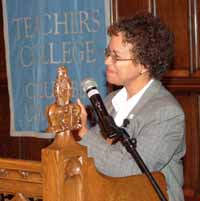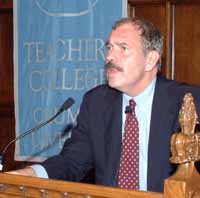Changing Times Demand New Focus on Mission and Strategy
Teachers College is strong, but new challenges now threaten U.S. education. A united community, plus clear ideals and strategies, will help TC remain a force for educational excellence.
These themes informed remarks by President Arthur E. Levine in his annual State of the College address, delivered March 17 in the recently renovated Milbank Chapel. Sharing the podium was Darlyne Bailey, Vice President of Academic Affairs and Dean of the College. Following Dr. Levine's overview -- assessing the health of "the forest" -- Dean Bailey addressed "the trees and the leaves" -- specific areas ranging from a new mission statement to issues affecting the present and future well-being of faculty, staff and students.
Rebuilding the Basics
Highlighting progress since his arrival 10 years ago, Dr. Levine described TC's robust health in indicators ranging from sound general finances and a strong Board of Trustees to recruitment of superior faculty and construction of new buildings. Last year, in the largest capital campaign ever by any education school, TC raised more than $150 million dollars. Besides benefiting academic programs, scholarship funds and facilities, capital funds have facilitated additional faculty recruitment and added seven endowed chairs.
A 25 percent expansion of faculty in the past five years has brought to TC educators of exceptional quality and idealism. Faculty generally enjoy reduced teaching loads and compensation comparable to levels at other leading education schools. The student body is the best and brightest, drawn to TC's excellent programs from throughout the country and the world.
Campus improvements include refurbished facilities and major new construction, including a new dormitory and conference center, now underway. The new Gottesman Libraries broke ground September 17. Other improvements include a greater diversity in staff's ethnic and social backgrounds.
Programmatically, new laboratory, demonstration and outreach projects are being established in Harlem, the Bronx, and internationally. Research funding has risen from year to year, and results have impacted public policy. "More of our rhetoric is being translated into action," Dr. Levine said. "We make a difference in practice."
Concerns
Dr. Levine regretted several remaining weakness at TC, voicing frustration that the ideal academic community he envisions remains elusive. Continuing shortcomings include less diversity among staff and fewer professional development opportunities than he would wish; some malfunctioning services and facilities that still needing rehabilitation; too little scholarship aid; persistent over-dependence on tuition as a revenue source; and the campus's continuing preoccupation with governance process, at the expense of substance. These issues are critical and must be addressed, Dr. Levine said.
Of greater concern, however, are national trends that threaten the economic future and autonomy of education schools, as well as the quality of U.S. education generally. In many states, huge budget deficits have brought program cuts pre-K through 16 -- "devastating for urban and rural schools." A historic national deficit promises more cuts in education and social programs.
The country's general economic woes also hurt higher education by shrinking endowments and program and research funds available from foundations. At the same time, schools are hit by higher health care and pension fund contributions, plus swelling post-9/11 insurance and security costs.
Urgency to hire new teachers has led states to support alternate career pathways to teaching and education administration, and these diminish the role of education schools. Criticism of education schools has triggered the setting of accountability standards by others. Government mandates increase schools' costs at the same that their funding is cut. And private and non-profit education programs now offer increasing competition.
Change by Substitution
"Does this mean we are in desperate straits? No." Dr. Levine said. "But increasingly, change will need to occur by substitution. If we want to do something new, something old will have to go."
In this new world, campuses must strive to avoid divisions among groups, conflicts over resources, and finger pointing; instead, they must strive to come together as a community, Dr. Levine said. Institutional focus and strategic planning must lead the new agenda, along with answering the question of "why we are here."
Clear priorities and a "timely, transparent, inclusive and depoliticized process" are key to dealing with budgets, Dr. Levine added. An important step is multiyear budgeting, and a Long Range Budget Planning Committee was established last year. By the end of 2003, a Strategic Planning Committee will report to the board of trustees its conclusions regarding solutions for addressing problems including the expected new fiscal challenges.
Looking around at the audience in the auditorium, and calling on many of the faculty and divisions by name, Dr. Levine asked for help and cooperation in generating the community spirit and clear set of objectives needed to meet what lies ahead.
"We have an opportunity to keep the issues visible and offer a continuing stream of research, policy proposals and demonstration projects....[that will] make a critical difference," Dr. Levine said. He urged community members to work with him at "...Tikkun Olam, to ‘repair the World,' which is why this college was created and why so many of us came here to work and study."
Dean Bailey on "The Power of the Inner Voice"
In her talk, Dean Bailey first noted some salient demographic characteristics of TC's 5,050 students, 153 full-time faculty, 200 part-time and adjunct faculty, 2 minority postdoctoral fellows, and more than 500 staff. She then discussed challenges that she had identified during her tenure over the last year and a half (?) in an exercise she described as "listening to the inner voice" of Teacher's College.
She found that the major issues fell into the five broad challenges: clarification of mission; crafting an educational community; improving the educational and social experiences of students; planning the financial future; and promoting TC's strengths on the local, national and international levels. Although each area poses distinct dilemmas, or "competing truths," Dean Bailey reported progress in addressing concerns within all five.
A community forum, including all of the college's stakeholder groups, has produced a draft mission statement, which Dean Bailey read to the audience. The statement attempts to capture the power of the college's unity while respecting its diversity of disciplines and perspectives. Remaining concerns, the dean noted, include resolving competing visions of the college as a professional school vs. graduate research institution, and the complications of maintaining academic autonomy within its relationship with Columbia University.
Understanding the importance of a united community that is respectful of the needs and views of all groups has been made central to the awareness of planning bodies at TC, Dean Bailey said. These include the Strategic Planning Committee and other College-wide committees.
To address the educational and social experience of students, the College has created the senior position of Associate Dean for Enrollment and Student Services. The appointee will lead in tying together existing services for students, including admissions, financial aid and residence life. Among other concerns, he or she will work to promote campus involvement of TC's largely part-time and commuting student body.
Other areas of focus within the student experience include determining the best use of "distant learning" technologies and teaching, a subject now being addressed by a faculty work group.
The goal in planning for the financial future is to foster greater efficiency and transparency of process while minimizing bureaucracy. Dean Bailey noted that the Long Range Budget Planning Committee mentioned in Dr. Levine's remarks includes faculty, students and staff working closely with Administration. This group met twice last semester. The Board of trustees will discuss how best to balance support among TC programs at its upcoming annual retreat.
The work of a newly announced Office for Research and Policy Development also has implications for the financial future. Its focus will include rethinking areas of emphasis at the College, research-based public policy recommendations, and transforming great ideas of faculty into proposals for federal funding.
The question, "How do we best promote our strengths on the local, national and international levels?" also addresses issues of balance. Among them is deciding how much emphasis to give programs for New York City versus commitments in other parts of the country and world. Great strides have been made in this area, Dean Bailey reported. TC initiated an alliance in Harlem with non-profits, faith-based and community organizations to focus on the educational needs of the uptown Manhattan community, and the College is working with the NYC Department of Education to assist in reorganizing public schools in the new Region 10.
TC also will lead a National Academy for Excellent Teaching to reinvent ways to upgrade skills of those working in underserved schools. The Academy already has begun efforts on behalf of the new Region 2 school district in the Bronx. Internationally, TC is leading curriculum development efforts in Afghanistan in partnership with UNICEF, and will next month begin work to realign similar existing programs in the People's Republic of China.
In addition to TC's advances in the five areas of challenge she outlined, Dean Bailey said that TC is progressing in three more general dimensions: gaining skill at balancing "black and white" perspectives in order live more comfortably in "the grays"; shifting from an "us and them" perspective to a true "we" sense of community; and keeping policy recommendations "grounded in the needs of those we serve."
She concluded that the College is responding, as it must, to both procedural and structural challenges, and that the shape of those responses will continue to evolve. Quoting Margaret Wheatley's assertion, "There is no power greater than a community discovering what it cares about," Dean Bailey added, "and acting upon it."
Published Monday, Oct. 6, 2003

